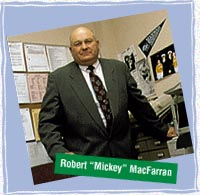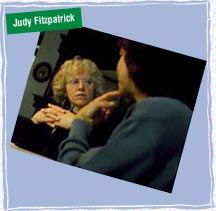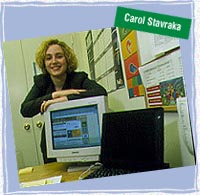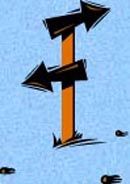


|



It’s probably one of the first questions you remember being asked, “What do you want to be when you grow up?” And then, a similar query is posed nearly endlessly as you proceed on life’s path, “So, what do you do for a living?” The burden of this question is a tremendous one, says FDU President J. Michael Adams, primarily because “in this culture, our identity often is related to our work.” Many people toss and turn worrying that they will make the wrong decision when choosing their careers. But Adams, a scholar in career decision making and development, believes, “There probably isn’t a wrong decision or choice.” Career choices should be seen not as finite ends, but as steps along a path of development. “It’s a process in which, at different points, decisions are made.” Adams recalls, “At 14, 15 or 16, I never fantasized, ‘If I could just be the president of a university ...’” |
|
FDU’s New College of General and Continuing Studies features many programs that help retool professionals with today’s most important skills. “With a commitment to sound educational standards,” notes Dean Kenneth Vehrkens, “the programs of the New College are designed to be responsive to the needs of lifelong learners.” For example, the College’s Portfolio of Skills program focuses on making people more versatile in today’s world. In addition to computer literacy, students learn quantitative reasoning skills; thinking skills (critical thinking and mind self- FDU has many other programs geared toward adult learners, from master of business administration in management with a concentration in information systems and the master of arts in psychology in organizational behavior for managers to certificate programs in Web design and e-commerce. More information is available through the Office of Adult and Graduate Admissions: Andrew Nelson, Teaneck- |
Opportunity KnocksAdams has written a variety of articles on career choice, such as “A Study of the Selected Relationships Between Socioeconomic Level, Age and the Fantasy and Realistic Occupational Choices of High School-Age Youth,” and a three-book series published by McGraw-Hill, which includes Career Change: A Planning Book. 
“The reality,” he says, “is that we are influenced in our career decisions when ideas or individuals with which we come in contact present opportunities. And these ideas or individuals influence our direction.” The path is not always a steady one, and abrupt turns often occur. (Click on Robert MacFarran to view sidebar.) “It is projected that individuals starting a career for the first time today will have to completely retrain three times during their productive work lives,” Adams says. “Based on the rate of technological change in this culture,” he continues, “we don’t know what potentially 60 percent of the jobs will be by the year 2011,” when today’s college freshmen will reach their most productive work years. Turn and Face the ChangesMany people in mid-career also are finding the need to retool for career opportunities. This is reflected in the increase in demand for graduate education and degree-completion, continuing education and certification programs in many fields — a demand which FDU is striving to meet. In fact, “students over 40 represent the fastest-growing age group in postsecondary education,” according to the American Association of University Women (AAUW). 
The association reports that, of those returning to college from a career, 46 percent of women and 48 percent of men cite changing to a completely different line of work as a very important reason for continuing their educations. (Click on Judy Fitzpatrick to view sidebar.) This may be caused by the vast technological changes to which Adams refers and the obsolescence of many careers brought about by those changes. Education in the New MillenniumEducation is focusing less and less on specific job skills and more and more on abilities that enable people to advance themselves in any field of work. Adams says the model of education with which we are most familiar may have to be replaced. This model dates back 2,000 years to Aristotle and is based on “owning” information. But, Adams points out, “What happens when there is too much information to own?” He says an educated person today is one who has: “the awareness and knowledge of how information is organized (information systems), the ability to find a specific piece of information when it is needed and the ability to synthesize that information into either a new idea or a solution to a problem.” 

This new model acknowledges the importance of computer technology in the information age. The AAUW states that 85 percent of those returning to college from the workplace and 78 percent of those entering college directly from high school agree that “it is almost impossible to get a decent job today without a firm knowledge of computers.” Many career options depend on computer skills. Educational Environments
Since career decisions are influenced by people with whom we interact, the educational environment becomes a crucial factor. (Click on Carol Stavraka to view sidebar.) “You should be seeking an environment in which you’re getting in contact with the greatest number of people and great ideas you possibly can,” Adams suggests. “This is one of the functions of higher education — to provide an environment where great people and great ideas come together.” The educational environment also can be brought into the workplace, Adams points out, by interning with professionals in a field that one likes, learning from their experience. Being in a professional environment related to one’s field of study can provide exposure to a wide range of people and career choices. Knowledge gained about potential career paths and specific positions in the field can guide one along the ever-developing career path. |

|
Going for the GoalThe key aspect in making career decisions is to know one’s life goals, which goes beyond choosing what to do for a living. These goals include lifestyle, the work environment, financial requirements, moral considerations and more. “As long as you can define your goals,” says Adams, “there probably isn’t a wrong career decision for you.” “There is no magic answer to the question ‘What do you want to be when you grow up?’ nor is there a specific career path that we are predestined to follow,” Adams emphasizes. Children aspiring to be firefighters, teachers or astronauts will change their minds countless times as they grow, mature and explore the endless possibilities. At age 40 or 50, they may be asking themselves what they want to be next. “You may never know precisely what you want to be when you grow up,” says Adams, “because it’s a process, not an endpoint. And, it’s a great adventure.” |
|
FDU Magazine Directory | Table of Contents | FDU Home Page | Alumni Home Page | Comments |
|